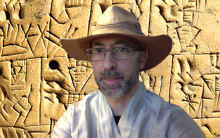Note: Zev Handel's five-year term as chair of AL&L began on July 1, 2020. He is Professor of Chinese Linguistics in the Department of Asian Languages and Literature, specializing in the study of the history of the Chinese language and East Asian writing systems. Professor Handel joined the faculty in 1999 after receiving his PhD from the University of California at Berkeley. A native of Boston, he now lives in Seattle with his wife and son.
Dear Alumni and Friends,
The other day, I was talking with a friend of the department about my taking up the role of chair and stepping into the very large shoes of my predecessor, Paul Atkins. “So what exactly does the chair do?” he asked. The question, so fundamental, nevertheless gave me pause. The chairship is an administrative position, so one might think of the chair as a kind of boss or manager. But while it’s true that the position carries with it some degree of authority, the analogy fails; the chair does not, for example, dictate to faculty what to research or how to teach. One could instead answer the question by enumerating a list of administrative duties that the chair must undertake each year, such as holding faculty meetings, shepherding hires and promotions, approving teaching assignments, authorizing expenditures, writing reports to the deans. But this dry characterization doesn’t seem to capture what the role is really about.
So what is it, I thought, that I have agreed to do by taking on this role? After a moment’s reflection, I answered that the essence of the chair’s role is to facilitate the educational and research mission of our department. And that the best way to do this is by providing support and resources for our highly talented faculty, staff, and students within the department and by building connections to communities and networks outside of the department. In this way we can best realize our vision of serving our local and global community by teaching and researching Asian languages and literatures in a broad humanistic context. (You can read our full Mission and Vision statements in the “About” section of our department website.)
As I sit at home (instead of in my office) in the midst of a devastating pandemic and financial crisis, our departmental mission has never seemed more challenging or more important. In our thoroughly inter-connected world, a humanistic understanding of the global cultures of the past and the present is as essential to our survival and prosperity as are the tools of the natural and social sciences. Plagues have been a part of human existence for all of recorded history. As Marta E. Hanson translates in her book Speaking of Epidemics in Chinese Medicine, Cao Zhi (192–232 ce, son of the famed Chinese warlord and poet Cao Cao) documented the intense suffering of a pandemic that claimed the lives of four of the seven Chinese literati known to history as the Seven Masters of Jian’an: “In 217 ce, pestilential qi circulated. Every household suffered deaths; in every house [people] wailed and wept in grief. In some cases, [they] closed their doors and died; in other cases, an entire lineage perished and mourned.” Learning about the past, and the different cultural approaches to facing and overcoming tragedy, provides us with the inspiration and fortitude needed to make sense of what is happening to us today and to seek a path to a better future.
In March, the University of Washington very suddenly made the decision to move entirely to remote learning in order to protect the health of the campus community. The abrupt transition to an unfamiliar mode of instruction was not easy for teachers, students, or staff. But everyone rose to the challenge. (Elsewhere in this issue you can read about how three of our department’s outstanding instructors navigated this challenge.) These past few months of “life during coronavirus” already loom so large in our collective consciousness that it is easy to forget what came before. Our department once again had a very successful year. In the pages of this newsletter you will read about our collective and individual achievements and milestones, including a remotely-held convocation ceremony in which we joyously celebrated our graduating students together with their families and friends. Reflecting on these accomplishments gives me confidence that we will continue to succeed, and reminds me that the dedication of the AL&L family makes my role as facilitator a happy one.
It is now July. The weather in Seattle has finally turned from chilly drizzle to gentle sunshine. By the time you read this, the weather will be turning again and our autumn quarter will be underway. All of our department’s classes will be in process of being taught remotely. At the time of this writing, the shape of the winter and spring quarters remains unknowable. But one thing we know for sure is that we will be here, serving our students and our communities, pursuing our research, teaching our classes, and preparing for a better future. I am grateful to each and every one of you who are invested in supporting that mission.
Wishing you all good health and good cheer,
Zev Handel, Professor of Chinese
